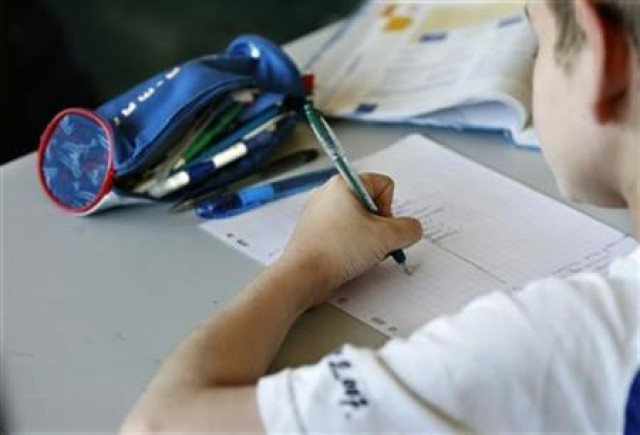Homework: Good guy gone rogue
Flooding a child with homework may only lead to poor academic outcomes

A schoolboy studies during a morning class in a primary classroom. PHOTO: REUTERS
PM’s education reforms look beyond face-lift
In fashion since the mid 19thcentury, homework was seen as an imperative accessory to imparting education for strengthening the mental muscle through reiteration. Indeed homework serves the said purpose. It goes beyond to teach students the ability to helm their own learning process through practice and prioritisation, and teaches other cardinal skills of education such as self-discipline, time management, and use of external resources for research purposes. Studies find there is partly positive relationship between time spent on homework and achievement on standardised testing and on school performance. It serves as a liaison between leaning environment in home and school, and allows parents to stay abreast of their child’s learning curve.
Except, homework has a curvilinear relationship with child’s class performance as recent studies allege too much homework is as detrimental as too little, and students only reap the best gains from it if they spend ‘moderate’ time on it. Hence, we need to stop viewing homework through our rose coloured glasses. Homework assignments are quickly becoming a drill rather than the learning tool they were once touted as. Teacher recounts and anecdotal evidence imply students who struggle with a subject are most likely the ones that spend the least amount of time on it, thus nullifying the purpose.
How much is too much?
In his book, Reforming Homework; Practices, Learning, and Policies, Australian educational psychologist Richard Walker details the outcome of a study that showed countries where students spent most time on home assigned tasks did not have accompanying test scores to show for it as they performed poorly on the Programme for International Student Assessment. He further quips, homework only had measurably positive outcome for students in the tenth-12th grade and did little favour to those in lower levels.
Making amends: Bringing out-of-school children back to classrooms
Not only inundating children with homework is futile in this regard, it has been shown to further mar academic performance by inducing stress and depression, blowing their development curve way out of proportions. For instance, a 2013 study published in the Journal of Experimental Education found that deluging high-schoolers with homework caused a plethora of health problems from anxiety, depression, obesity, insomnia and stress to lack of circadian balance and alienation from society. This stands for both average and high-achieving students.
Secondly, the transition of learning environment from school to home is not seamless even though atmosphere at home bears down heavily on outcome and quality of homework. For starters, the levels of parents’ education are a big determinant of the treatment school assigned task receives at home. There is a positive relationship between socio-economic and cultural environment of home and the degree of parental involvement with homework. However, there is a precarious balance between too much parental influence on homework and too little. This is because while excessive pressure to finish homework does student no good, associating too little importance and not keeping a tab on its completion perpetuates poor self-learning habits in children.
Finally, in low income households where both parents are breadwinners, homework is more of an added chore, a punishment of sorts where children do not have the right educated support or resources at hand. In this case, emotional stress from inability to fulfill teacher’s expectations results in poor class performance and poor academic outcomes, for even the gifted but underprivileged children. They would otherwise benefit from simply completing allotted tasks in class, without having to turn in repeated material as homework.
Education Atlas shows negligible rise in school enrollment
There is certainly no advocacy for completely abolishing the homework culture but it has been proven time and again that the monotony of remedial homework serves the doer little purpose. Often, it is reflective of poor teaching methodologies that seek homework as fail-safe to successfully complete the lesson outside class time; almost as if the school snuck back home with the child. Therefore, if you want to raise well rounded, intelligent, creative kids and not just good test takers, let them be children longer. Let them play make-believe just a bit longer, indulge in arts and craft, or take on competitive sports. And when it comes to assigning homework, look beyond double digit multiplications to see how you can multiply their future learning opportunities and their love for education. You will be making learning easier and better for all of you.



















COMMENTS
Comments are moderated and generally will be posted if they are on-topic and not abusive.
For more information, please see our Comments FAQ